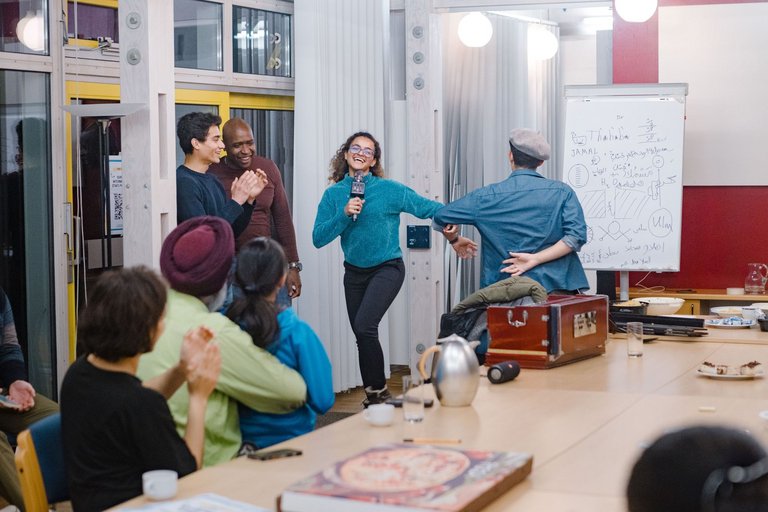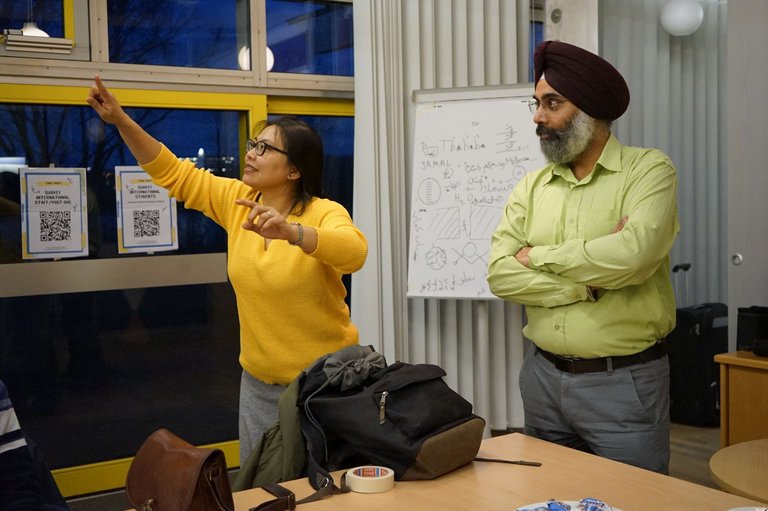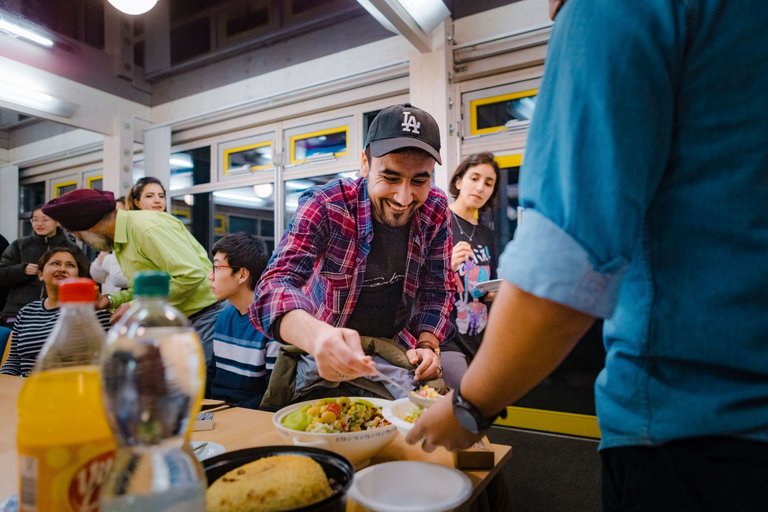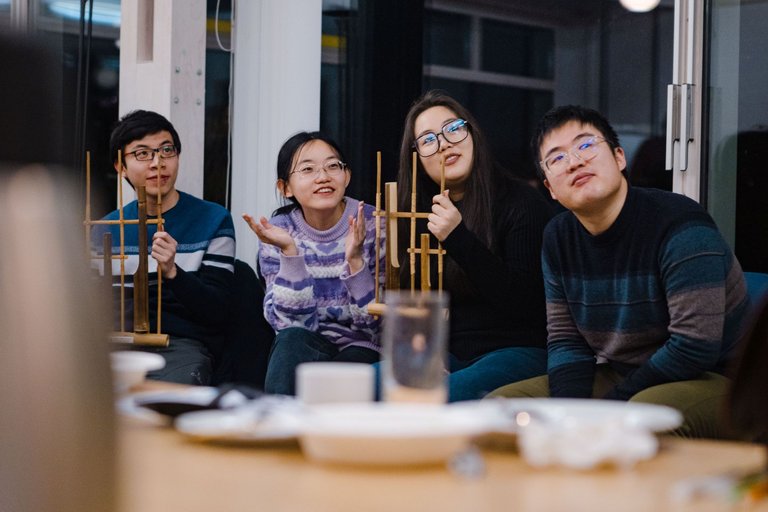"Engineering for a Sustainable Future" - with this goal in mind, people from almost 100 nations study and work together at TU Ilmenau. Professional, but also human encounters, successful cooperation and peaceful coexistence characterize living together on the university campus. In our new series "diversity connects", we introduce students and employees from different cultures who have arrived in Ilmenau and are involved at the university in a variety of ways. To kick things off, we met some of them at the Language Club at the end of their semester.
"Diversity connects": Building bridges between cultures − end of semester in the Language Club

Overcoming language and social barriers, learning from each other and learning German in a fun way - this is the goal of 65 language enthusiasts from Poland, Lithuania, Afghanistan, Ukraine, China, Indonesia, Kazakhstan, Pakistan, Iran, Kenya, Brazil, Morocco, Zimbabwe, Iraq and India. In the Language Club, an initiative of TU Ilmenau members, they come together every Wednesday to practise German. They have now celebrated the end of the semester together in the International Meeting Center on campus.
The offer was initiated by members of the university as a supplement to the language courses: "We have found that language is the biggest obstacle to integration, and both the university and the city should consider it an important issue that can contribute to harmony and peace in our city," says Dr. Sukhdeep Singh, head of the Bioorganic Chemistry of Bioactive Surfaces Research Group and initiator of the Language Club, explaining the motivation: "But this is not a classroom and the whole thing is not a language course with compulsory attendance, but a relaxed discussion group."
"Taking away people's fear of speaking"
The club emerged from the Indian community. It now spans all areas and cultures. The organization is now also spread over several shoulders: In addition to Dr. Sukhdeep Singh, Dr. Jialan Cao-Riehmer, Head of the Microfluid Biotechnique Research Group, Mira Rochyadi-Reetz, PhD student at the Group for Media Research and Political Communication, and Fabian de Planque, member of ISWI e.V., co-lead the discussion group - on a voluntary basis: "Because so many people are involved, we don't all have to be there every time," says Dr. Singh happily: "For example, if I can't be there, someone else who has time will take over." They all tell the group about their own experiences as new arrivals in Ilmenau many years ago. They often bring their families to the meetings. Dr. Singh explains that they have deliberately called their offer a language club rather than a language course:
It's not so much about teaching grammar, but about taking away people's shyness about speaking and giving them the feeling that they are not alone. Once they have arrived here as students or employees, they should be able to go out into society as quickly as possible, integrate socially and become independent.
To this end, a different social topic is on the agenda each time - from waste separation, dealing with the authorities and employment law to finding accommodation and club life. Many other members of the university and people from Ilmenau support the program with contributions. Last semester, for example, the we4you career service, student health management, the Equal Opportunities Council and course instructors from the University Sports Center invited club members to their homes, as well as to the university library, the Ilmkubator start-up service and the free church community. There they came together with locals to play music before Christmas. Community member and doctor Dr. Stefan Mohr also gave the new arrivals an introduction to everything they need to know about visiting a doctor in Germany. Conversely, the Chinese community sang and danced in October at "MiteinanderStärken", a series of events organized by the House of Resources Thuringia, Kreisjugendring Ilm-Kreis e.V. and Kuko e.V., supported by the City of Ilmenau, which is committed to a vibrant, cosmopolitan Ilmenau and against violence and discrimination. Networking between people in the city of Ilmenau and the international students is also a goal of the Language Club.
"We are almost a family"
Kamila Costa, a doctoral student at the Group for Lightning and Surge Protection, is a participant who has been with us for a long time:
For me, the Language Club was first of all an opportunity to meet new people who have the same challenge as me: building a new life in Ilmenau.
She was encouraged to do so by Dr. Jialan Cao-Riehmer, who took care of the funding for the offer from the "Thüringer Ministerium für Migration, Justiz und Verbraucherschutz" via the "Connecting humans" project: "I met Jialan at an event. Since then, I've been there every week if possible."
It's about improving my German, but not just that. It's also about culture: German culture, but also the cultures of others. Today, for example, we brought food from many different countries. I really like that. We are almost a family.
Kamila also receives support from her colleagues:
In my field, everyone is very open and always there to help. Especially when they realize that we are interested in German culture, they answer all our questions: from waste separation to health insurance.
At the end of the semester, Kamila shared her joy of singing and making music with the others in the club. Mira Rochyadi-Reetz had brought instruments from her home country of Indonesia with her: "The angklung is a traditional instrument made of bamboo that you can only play together with others," she explains. She practiced a simple melody together with the club members. At first it sounded a little bumpy, but over time it became more and more harmonious. They spoke and sang in German:
There are many international students at TU Ilmenau, but too few opportunities for them to speak German and not enough places on language courses. And even those who do have a place often have few contacts with Germans to begin with.
Mira Rochyadi-Reetz knows what this means from her own experience as a newcomer to Ilmenau. Even though she herself is now married to a German, it is still a matter close to her heart to make it easier for others to settle in Ilmenau and to build bridges between cultures. Her motto: "Don't complain, do it."
"I also want to be able to take part in discussions during my studies"
She has also helped Yifei Zhu, a Master's student in his first semester of mechanical engineering. He has also joined the Language Club to improve his German: "I have a lot of German friends. They are very friendly, but sometimes I don't understand them. I also want to be able to take part in discussions during my studies."
He became aware of the course through Dr. Jialan Cao-Riehmer:
Although I can't come every time, I enjoy it a lot because I also make new friends from other cultures on the course and we do lots of activities together.
At the end of the semester, not only Indonesian instruments but also an Afghan harmonium could be heard in the meeting center, and at the joint pizza dinner, the aim was to present and guess German terms using pantomime. Yifei Zhu and his friends definitely want to come back next semester:
Even though my unit day is long because I have my first lecture at 7 a.m., I like coming here in the evening to have fun with the others.
The organizational team also agrees, says Dr. Cao-Riehmer:
Even without further funding, we want to continue the Language Club. Because the enthusiasm of young people from different cultures also enriches us enormously.
The Language Club will continue to meet in the new semester on Wednesdays from April 8 from 5 to 7 pm in the Interclub (House L 6c basement). Anyone interested can simply drop in. Further support from native German speakers is very welcome.




